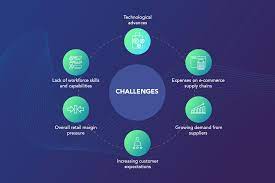Before generative AI became mainstream, tech-savvy retailers had long been leveraging transformative technologies to automate tasks and understand consumer behavior. Insights from consumer and future trends, along with predictive analytics, have long guided retailers in improving customer experiences and enhancing operational efficiency. AI for Consumers and Retailers improved customer experiences.
While AI is currently used for personalized recommendations and online customer support, many consumers still harbor distrust towards AI. Salesforce is addressing this concern by promoting trustworthy AI with human oversight and implementing powerful controls that focus on mitigating high-risk AI outcomes.
This approach is crucial as many knowledge workers fear losing control over AI. Although people trust AI to handle significant portions of their work, they believe that increased human oversight would bolster their confidence in AI. Building this trust is a challenge retailers must overcome to fully harness AI’s potential as a reliable assistant.
So, where does the retail industry stand with AI, and how can retailers build consumer trust while developing AI responsibly?
AI for Consumers and Retailers
Recent research from Salesforce and the Retail AI Council highlights how AI is reshaping consumer behavior and retailer interactions. AI is now integral to providing personalized deals, suggesting tailored products, and enhancing customer service through chatbots. Retailers are increasingly embedding generative AI into their business operations.
A significant majority (93%) of retailers report using generative AI for personalization, enabling customers to find products and make purchases faster through natural language interactions on digital storefronts and messaging apps. For instance, a customer might tell a retailer’s AI assistant about their camping needs, and based on location, preferences, and past purchases, the AI can recommend a suitable tent and provide a direct link for checkout and store collection.
As of early 2024, 92% of retailers’ investments were directed towards AI technology. While AI is not new to retail, with 59% of merchants already using it for product recommendations and 55% utilizing digital assistants for online purchases, its applications continue to expand. From demand forecasting to customer sentiment analysis, AI enhances consumer experiences by predicting preferences and optimizing inventory levels, thereby reducing markdowns and improving efficiency.
Barriers and Ethical Considerations
Despite its promise, integrating generative AI in retail faces significant challenges, particularly regarding bias in AI outputs. The need for clear ethical guidelines in AI use within retail is pressing, underscoring the gap between adoption rates and ethical stewardship. Strategies that emphasize transparency and accountability are vital for fostering responsible AI innovation.
Half of the surveyed retailers indicated they could fully comply with stringent data security standards and privacy regulations, demonstrating the industry’s commitment to protecting consumer data amidst evolving regulatory landscapes.
Retailers are increasingly aware of the risks associated with AI integration. Concerns about bias top the list, with half of the respondents worried about prejudiced AI outcomes. Additionally, issues like hallucinations (38%) and toxicity (35%) linked to generative AI implementation highlight the need for robust mitigation strategies.
A majority (62%) of retailers have established guidelines to address transparency, data security, and privacy concerns related to the ethical deployment of generative AI. These guidelines ensure responsible AI use, emphasizing trustworthy and unbiased outputs that adhere to ethical standards in the retail sector.
These insights reveal a dual imperative for retailers: leveraging AI technologies to enhance operational efficiency and customer experiences while maintaining stringent ethical standards and mitigating risks.
Consumer Perceptions and the Future of AI in Retail
As AI continues to redefine retail, balancing ethical considerations with technological advancements is essential. To combat consumer skepticism, companies should focus on transparent communication about AI usage and emphasize that humans, not technology, are ultimately in control.
Whether aiming for top-line growth or bottom-line efficiency, AI is a crucial addition to a retailer’s technology stack. However, to fully embrace AI, retailers must take consumers on the journey and earn their trust.













